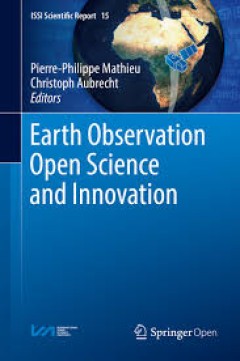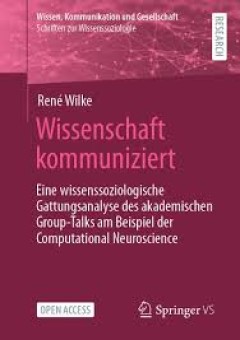Filter by

Transdisziplinär und transformativ forschen, Band 2 : Eine Methodensammlung
Dieses Open-Access-Buch setzt die 2018 begonnene Sammlung von Methoden für transdisziplinäre, transformative wie nicht-transformative Forschung fort. Auch in Band 2 werden Methoden der Wissenserzeugung, Wissensintegration und Transformation so ausführlich beschrieben, dass Dritte sie umsetzen können. Entwickelt wurden die Methoden von Reallaboren in Baden-Württemberg, sie eignen sich jedoc…
- Edition
- 1
- ISBN/ISSN
- 9783658271350
- Collation
- X, 374 hlm; ill., lamp.,
- Series Title
- -
- Call Number
- -

The Potato Crop : Its Agricultural, Nutritional and Social Contribution to Hu…
This book is open access under a CC BY 4.0 license. This book provides a fresh, updated and science-based perspective on the current status and prospects of the diverse array of topics related to the potato, and was written by distinguished scientists with hands-on global experience in research aspects related to potato. The potato is the third most important global food crop in terms of cons…
- Edition
- 1
- ISBN/ISSN
- 9783030286835
- Collation
- XVII, 518 hlm; ill., lamp.,
- Series Title
- -
- Call Number
- -

Manual of Digital Earth
This open access book offers a summary of the development of Digital Earth over the past twenty years. By reviewing the initial vision of Digital Earth, the evolution of that vision, the relevant key technologies, and the role of Digital Earth in helping people respond to global challenges, this publication reveals how and why Digital Earth is becoming vital for acquiring, processing, analysing…
- Edition
- 1
- ISBN/ISSN
- 9789813299153
- Collation
- XIX, 852 hlm; ill., lamp.,
- Series Title
- -
- Call Number
- -

The Pathway to Publishing: A Guide to Quantitative Writing in the Health Scie…
Scientific writing is a key skill for researchers. Scientific writing develops critical thinking, helps scientists connect their local results with global understanding, and helps scientists identify appropriate next questions to explore. Increased scientific writing capacity within a research group allows more study results to be shared with the practitioner community and policy makers…
- Edition
- -
- ISBN/ISSN
- 9783030981754
- Collation
- XIII, 186
- Series Title
- -
- Call Number
- -

Ionospheric Multi-Spacecraft Analysis Tools : Approaches for Deriving Ionosph…
This open access book provides a comprehensive toolbox of analysis techniques for ionospheric multi-satellite missions. The immediate need for this volume was motivated by the ongoing ESA Swarm satellite mission, but the tools that are described are general and can be used for any future ionospheric multi-satellite mission with comparable instrumentation.
- Edition
- -
- ISBN/ISSN
- 978-3-030-26732-2
- Collation
- X, 288
- Series Title
- ISSI Scientific Report Series (ISSI, volume 17)
- Call Number
- -

Earth Observation Open Science and Innovation
This book reviews these megatrends and their implications for the Earth Observation community as well as the wider data economy. It provides insight into new paradigms of Open Science and Innovation applied to space data, which are characterized by openness, access to large volume of complex data, wide availability of new community tools, new techniques for big data analytics such as Artificial…
- Edition
- -
- ISBN/ISSN
- 978-3-319-65633-5
- Collation
- IX, 330
- Series Title
- ISSI Scientific Report Series (ISSI, volume 15)
- Call Number
- -

Foltersituationen und Wissensflüsse : Soziologische Überlegungen zur Gewalt…
In diesem Open-Access-Buch geht Max Breger Fragen zu Folter aus Perspektive der interaktionistischen Soziologie nach. Folter ist eine extreme Form zwischenmenschlichen Handelns, die als Menschenrechtsverletzung zwar delegitimiert, aber übliche Praxis moderner Staaten ist. Dabei nutzen Folternde die vielfältigen leiblich-psychischen Verletzlichkeiten des Menschen, um als ‚feindlich‘ versta…
- Edition
- -
- ISBN/ISSN
- 978-3-658-45339-8
- Collation
- XVII, 326
- Series Title
- Wissen, Kommunikation und Gesellschaft (WISSEN)
- Call Number
- -

Gemeinsam Musizieren : Zur Soziologie und Ethnographie der Streichensembles
Die Untersuchung baut auf Alfred Schütz‘ klassischem Aufsatz „Gemeinsam Musizieren“ auf und folgt der Frage, wie es Musiker:innen gelingt, mit Noten und Instrumenten gemeinsam zu musizieren und wie dies durch die Spielenden erlebt wird. Sie wird anhand von Streichensembles untersucht, die ohne Dirigierende musizieren. Durch die Integration von Videographie, fokussierter und lebensweltana…
- Edition
- -
- ISBN/ISSN
- 978-3-658-42162-5
- Collation
- XXVI, 517
- Series Title
- Wissen, Kommunikation und Gesellschaft (WISSEN)
- Call Number
- -

Wissenschaft kommuniziert : Eine wissenssoziologische Gattungsanalyse des aka…
Dass (soziale) Wirklichkeit in Interaktionsprozessen erzeugt und institutionalisiert wird, ist eine aus der Wissenssoziologie bzw. dem Sozialkonstruktivismus bereits wohlbekannte Erkenntnis. Dass diese Erzeugung maßgeblich durch kommunikatives Handeln prozessiert wird, ist spätestens seit dem Kommunikativen Konstruktivismus bekannt. Zentral in vorliegender Analyse ist daher die spezifische Fo…
- Edition
- -
- ISBN/ISSN
- 978-3-658-36704-6
- Collation
- XV, 277
- Series Title
- Wissen, Kommunikation und Gesellschaft (WISSEN)
- Call Number
- -

Das ökonomische Laboratop : Eine soziologische Ethnographie des wirtschaftsw…
Dieses Open-Access-Buch ist die erste soziologische Ethnographie, die sich der Forschungspraxis wirtschaftswissenschaftlicher Laborexperimente widmet. Wissenschaftliche Labore sind Orte der Außeralltäglichkeit, die zum Zweck wissenschaftlicher Untersuchungen geschaffen werden. Der Untersuchungsgegenstand ökonomischer Laborexperimente ist das menschliche Entscheidungsverhalten. Dieses ist imm…
- Edition
- -
- ISBN/ISSN
- 978-3-658-33019-4
- Collation
- IX, 392
- Series Title
- Wissen, Kommunikation und Gesellschaft (WISSEN)
- Call Number
- -
 Computer Science, Information & General Works
Computer Science, Information & General Works  Philosophy & Psychology
Philosophy & Psychology  Religion
Religion  Social Sciences
Social Sciences  Language
Language  Pure Science
Pure Science  Applied Sciences
Applied Sciences  Art & Recreation
Art & Recreation  Literature
Literature  History & Geography
History & Geography